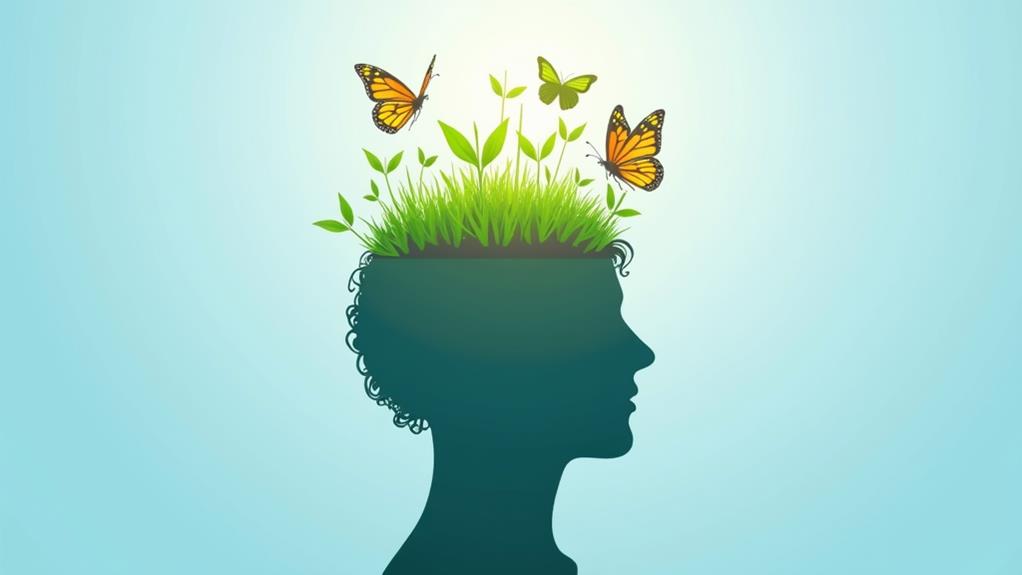
Mindfulness exercises boost positive thinking by reshaping how your brain processes emotions and thoughts. By consistently practicing mindfulness, you’re engaging in a form of mental training that increases the grey matter in regions associated with memory and cognitive flexibility. This change enhances your capability to regulate emotions, reduces symptoms of anxiety, and strengthens neural pathways that foster positive emotions.
You effectively rewire your brain to adopt a more optimistic and resilient outlook. The more you integrate mindfulness into your daily routine, the more profound the benefits to your mental health, suggesting a treasure trove of insights lies ahead.
Key Takeaways
- Mindfulness cultivates awareness, allowing recognition and dismissal of negative thoughts.
- Regular practice strengthens neural pathways linked to positive emotions and optimism.
- Enhances emotional regulation, reducing stress and promoting a positive mindset.
- Fosters cognitive flexibility, aiding in perceiving situations more positively.
- Encourages presence in the moment, diminishing focus on past or future worries.
Understanding Mindfulness
Mindfulness, at its core, involves being fully present in the moment, engaging with your surroundings and internal experiences without judgment. This practice roots itself in meditation, where you train yourself to attend to the now, not the past or future. It’s about noticing your thoughts, emotions, and physical sensations as they are. You learn to observe them without criticism or immediate reaction, fostering a profound level of self-awareness.
As you explore further into mindfulness, you’ll notice it’s not just a practice but a way of being. This shift in approach requires consistent practice, but the benefits are substantial. By directing your focus inward and becoming more aware of your mental and emotional states, you contribute to your own emotional regulation.
This isn’t about suppressing what you feel but understanding your reactions and responding more effectively.
Enhanced emotional regulation through mindfulness leads to less dwelling on negative thoughts and a stronger inclination towards positive thinking. You start to see challenges as opportunities for growth. The non-reactive stance you develop helps maintain a more positive outlook, even in less ideal circumstances.
Psychological Benefits

Numerous studies have shown that participating in mindfulness exercises can greatly alleviate symptoms of anxiety, depression, and somatic distress. By engaging in practices like mindfulness-based stress reduction, you’re not just reducing these negative symptoms; you’re also reshaping your emotional and cognitive landscapes. This transformation paves the way for improved positive thinking, as research highlights the shift in affective processes that these exercises promote.
Mindfulness meditation, in particular, fosters a change in how you process emotions and handle cognitive tasks. It enhances your emotional processing, allowing you to experience and understand your emotions without overwhelming distress. This capability is essential in reducing depressive symptoms and fostering a positive outlook.
Additionally, the development of cognitive flexibility through mindfulness lets you adapt to new situations with ease, enhancing your resilience and overall mental health.
Brain Function Improvements

Building on the psychological advantages of mindfulness, it’s essential to explore how these practices boost brain function. As you explore mindfulness exercises, you’re not just calming your mind, but also fundamentally altering your brain’s structure and functionality. Research highlights that these exercises lead to significant brain function improvements, particularly by increasing the grey matter in areas related to cognitive flexibility and memory. This structural enhancement supports your ability to switch between tasks and think creatively, factors vital for adapting to new challenges.
Furthermore, mindfulness strengthens your attention span and working memory. These are crucial for maintaining focus on tasks and absorbing new information efficiently, which in turn, sharpens your overall cognitive performance. As you continue practicing, you’ll notice a more robust capacity to process information and make decisions. This isn’t simply about being more efficient; it’s about enhancing the quality of your mental processes.
Moreover, the benefits extend to emotional regulation. By improving how you manage and respond to emotions, mindfulness exercises foster a more positive mindset, reduce stress, and contribute to better mental health. These changes in emotional regulation directly impact your everyday interactions and long-term psychological resilience.
Physical Health Effects

As you engage in mindfulness exercises, one of the significant physical benefits you’ll experience is enhanced sleep quality.
This improvement in rest is essential, as it directly correlates with lower blood pressure, fostering an environment where positive thinking can flourish.
These changes not only boost your immediate well-being but also contribute long-term to a healthier, more resilient body.
Enhancing Sleep Quality
Mindfulness exercises greatly enhance your sleep quality by alleviating insomnia symptoms and increasing sleep duration. When you engage in mindfulness practices such as deep breathing or body scan meditation before bed, you’re setting the stage for a night of deeper, more restorative sleep. These techniques specifically target the reduction of racing thoughts—a common barrier to falling asleep—and promote an overall state of relaxation.
By integrating mindfulness into your nightly routine, you can substantially reduce sleep disturbances. This isn’t merely about spending more time asleep, but enhancing the quality of that sleep. Improved sleep efficiency means that you spend less time tossing and turning and more time in the restorative stages of sleep, which are essential for physical and mental recovery.
Regular mindfulness practice doesn’t just help you fall asleep faster; it also impacts your daily life. You’ll notice increased energy levels, improved mood, and sharper cognitive functions. All these benefits stem from better sleep, proving that the quality of your night affects the quality of your day. Incorporating mindfulness exercises into your evening routine is a powerful way to improve sleep quality and, in turn, boost your overall well-being.
Lowering Blood Pressure
Several studies have shown that participating in mindfulness exercises like meditation and deep breathing can significantly lower your blood pressure. This decrease isn’t just a temporary improvement but a substantial benefit to your physical health. When you regularly integrate mindfulness practices into your routine, you’re taking a proactive step towards protecting against heart disease and stroke—two major health threats exacerbated by high blood pressure.
Delving deeper, mindfulness exercises such as meditation and deep breathing work by enhancing your body’s relaxation response. In contrast to the stress response which raises blood pressure and stress hormones, the relaxation response helps to stabilize these levels, promoting a healthier blood pressure. It’s this shift in physiological states that not only supports immediate calm but also contributes to long-term cardiovascular health.
Furthermore, the connection between regular mindfulness practice and improved blood pressure readings isn’t coincidental. Studies consistently demonstrate that those who meditate or engage in similar practices experience better regulation of their blood pressure. This regulation is vital, considering that consistent high blood pressure can lead to serious health issues, including heart attack and kidney disease.
Enhancing Relationships

When you practice mindfulness, you’re not just enhancing your own mental clarity; you’re also fostering empathetic connections that can reduce conflicts in your relationships.
This heightened empathy and understanding often lead to deeper emotional bonds, as you become more attuned to the feelings and needs of others. Consequently, these improvements in emotional regulation and communication contribute to more harmonious and supportive interactions within your relationships.
Fostering Empathetic Connections
Through the practice of mindfulness exercises, you can greatly enhance your empathetic connections, paving the way for deeper and more compassionate relationships. By focusing on emotional regulation, mindfulness allows you to respond rather than react during intense emotional exchanges. This self-awareness cultivates empathy towards others by helping you understand their emotional states, fostering a more profound connection.
Mindfulness practices such as meditation improve your communication skills by promoting active listening. When you truly listen, not just waiting for your turn to speak but genuinely understanding the other person’s perspective, empathy grows. This enhanced empathy leads to stronger relationships where each individual feels heard and valued.
Moreover, the cultivation of compassion through mindfulness not only extends to others but also to oneself. Recognizing and accepting your own emotions without judgment strengthens your ability to offer the same kindness and understanding to others. This reciprocal compassion is the cornerstone of healthy, resilient relationships.
Reducing Relationship Conflicts
As you incorporate mindfulness exercises into your daily routine, you may notice a significant decrease in relationship conflicts. This improvement often stems from enhanced communication skills. By practicing mindfulness, you’re not just listening; you’re learning to truly hear what your partner is saying. This deeper level of understanding fosters empathy and compassion, essential ingredients for resolving conflicts effectively.
Mindfulness also boosts your self-awareness, allowing you to recognize your emotional triggers and patterns in interactions. This awareness helps you approach conflicts from a calmer, more informed place, reducing the likelihood of reactive, emotional escalations. Instead, you’re equipped to engage in meaningful conflict resolution that prioritizes emotional connection and mutual respect.
Moreover, the emotional regulation that comes with regular mindfulness practice means you’re better able to manage stress and anxiety, which are often at the heart of relationship strife. This calmer state not only makes you a more patient and understanding partner but also promotes a positive learning environment within the relationship. As both partners become more attuned to each other’s needs and emotions, the foundation of the relationship strengthens, leading to reduced conflicts and enhanced overall well-being.
Deepening Emotional Bonds
Why should you consider integrating mindfulness into your relationship routines? Mindfulness exercises not only enhance your own well-being but also profoundly deepen your emotional connections. By fostering empathy and compassion, these practices enable you to truly tune into your partner’s feelings and perspectives. This heightened empathy strengthens the emotional bonds that are vital for a resilient relationship.
Mindfulness aids in emotional regulation, which is pivotal during disagreements. Instead of reacting impulsively, you’re more likely to respond calmly and constructively, reducing conflicts. This improved regulation promotes healthier communication, allowing both partners to express their thoughts and feelings more effectively and without escalation.
Moreover, mindfulness cultivates a deeper level of understanding and intimacy. By being fully present, you can connect more profoundly, appreciating shared moments and creating a stronger emotional foundation. This not only enhances the quality of interactions but also solidifies a sense of partnership and mutual support.
Incorporating mindfulness into your relationship routines can transform your interactions. It reduces misunderstandings, improves emotional expression, and, most importantly, strengthens the bonds that keep relationships thriving. Isn’t it worth giving it a try?
Mindfulness in the Workplace

Many workplaces are now recognizing the significant benefits of integrating mindfulness exercises into their daily routines. As you explore the practice, you’ll notice an increase in your productivity. This isn’t just a feeling; it’s a direct result of enhanced focus and sharpened decision-making skills. Mindfulness helps you clear the mental clutter, allowing you to prioritize tasks more effectively and make decisions with greater clarity.
Moreover, mindfulness dramatically cuts down on absenteeism. Employees who engage in regular mindfulness practices often report higher job satisfaction. They’re not just showing up more; they’re also more engaged and happier while they’re there. This boost in morale can be a game-changer for any organization looking to retain top talent.
But the benefits don’t stop there.
Mindfulness in the workplace also fosters creativity. With reduced stress levels and fewer conflicts, a positive work culture flourishes, making it a breeding ground for innovation. You’ll find yourself more open to new ideas and different perspectives, which is essential in any creative process.
Personal Growth Contributions

Personal growth, a pivotal benefit of mindfulness exercises, emerges strongly through enhanced self-awareness and emotional regulation. When you engage in these practices, you’re not just quieting the mind; you’re delving into the mechanics of your emotions and reactions. This heightened self-awareness allows you to recognize patterns that may hinder your happiness and productivity.
Mindfulness nurtures self-compassion, helping you to forgive yourself for past mistakes—a critical step towards resilience. This resilience isn’t just about bouncing back; it’s also about forging a path forward with greater insight and confidence. You’ll find that adaptability becomes second nature as you learn to handle life’s inevitable changes with ease.
Moreover, the development of a growth mindset through mindfulness is essential. It encourages you not just to cope with challenges but to embrace them as opportunities for personal development. This shift in perspective is crucial as it transforms obstacles into stepping stones, propelling you towards your goals.
Educational Impact

A significant number of schools have now integrated mindfulness exercises into their curricula, observing marked improvements in student focus and attention. These practices aren’t just about sitting still and being quiet; they’re transforming educational environments.
You’ll find that mindfulness exercises enhance not only academic performance but also emotional regulation among students. This means less stress and anxiety in classrooms, paving the way for a more conducive learning atmosphere.
Think about the last time you felt overwhelmed; it isn’t easy to concentrate, is it? Now, imagine being a student facing similar emotions. Mindfulness helps by equipping students with the skills to manage their feelings, leading to clearer, more focused thinking. This is essential during formative educational years.
Moreover, mindfulness fosters empathy and compassion. When you understand and relate to the emotions of your peers, conflicts decrease and communication improves. These skills are fundamental for creating a harmonious school environment and fostering effective teamwork.
In essence, incorporating mindfulness into education doesn’t just boost individual performance; it enhances the overall school climate, making it a nurturing place for personal growth, resilience, and adaptability. You’re not just learning math or science; you’re learning how to be a better human being.
Practical Mindfulness Applications

To effectively apply mindfulness in your daily life, start by incorporating simple exercises like focused breathing or mindful walking into your routine. These practices aren’t just calming; they’re your tools to enhance present-moment awareness and foster acceptance of experiences. When you’re deeply attuned to the here and now, you’re less likely to fixate on past regrets or future worries.
Mindfulness exercises help you shift focus from negative thoughts that often dominate your mind. By regularly engaging in practices such as meditation or body scans, you cultivate a mental environment where positive thinking can flourish. This isn’t just about feeling good momentarily; it’s about retraining your brain.
Regular mindfulness practice strengthens neural pathways associated with positive emotions and thinking, fundamentally rewiring your brain for a more optimistic outlook.
Moreover, the role of mindfulness in emotional regulation can’t be exaggerated. It equips you to better manage stress and anxiety by breaking the cycle of chronic negativity and overthinking. Each moment of mindfulness adds up, gradually building your capacity to handle life’s ups and downs with a balanced perspective.
Frequently Asked Questions
Why Does Mindfulness Help People Have a Positive Mindset?
Mindfulness helps you reduce stress, increase self-awareness, and improve focus. It enhances emotional regulation, gratitude practices, and shifts perspectives, leading to enhanced well-being and a consistently positive mindset.
How Does Mindfulness Promote Positive Mental Health?
How do you benefit from mindfulness? It enhances focus, boosts emotional regulation, and increases self-awareness, leading to stress reduction, improved relationships, greater resilience, and cognitive flexibility. You’ll experience a notable improvement in your mental health.
How Does Mindfulness Help With Thoughts?
Mindfulness enhances your self-awareness and emotional regulation, helping you restructure cognitively. It also reduces stress, strengthens mind-body connections, and improves focus, ultimately fostering gratitude and positive thinking through consistent practice.
Does Mindfulness Increase Positive Emotions?
Mindfulness magnifies your positive emotions through emotional regulation, stress reduction, and resilience building. It cultivates cognitive reframing, self-awareness, gratitude practice, and empathy development, fundamentally transforming how you perceive and react to daily experiences.
Conclusion
As you immerse yourself in the gentle flow of your breath, envision the positive transformation mindfulness brings. Studies have shown that this simple practice not only calms your mind but also enhances your brain’s structure, boosting cognitive flexibility and emotional resilience. It’s like watering a plant, nurturing it to bloom. Embrace mindfulness fully—whether at work, in relationships, or during personal challenges—and watch as the seeds of positivity and understanding flourish within you, creating a vibrant, healthier life.
Take The Next Step, Purchase a Copy
Are you verbalizing defeat and expecting victory?
Are you Sabotaging your future?
Speak Positive, you are Prophesying the future.
Be Positive or Be quiet, A book by Mark E Wilkins. The Audio Book , Kindle and
Amazon Paper back are available in French, Spanish and Tagalog. Be sure to buy two copies and give
one to a friend, remember you do reap what you sow.
